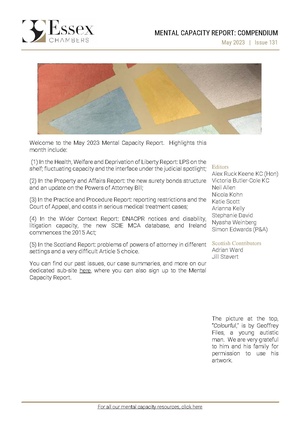| Display title | Abbasi v Newcastle Upon Tyne Hospitals NHS Foundation Trust [2023] EWCA Civ 331 |
| Default sort key | Abbasi v Newcastle Upon Tyne Hospitals NHS Foundation Trust (2023) EWCA Civ 331 |
| Page length (in bytes) | 1,851 |
| Page ID | 15076 |
| Page content language | en - English |
| Page content model | wikitext |
| Indexing by robots | Allowed |
| Number of redirects to this page | 0 |
| Counted as a content page | Yes |
| Page image |  |
| Edit | Allow only users with "editing" permission (infinite) |
| Move | Allow only users with "editing" permission (infinite) |
| Page creator | Jonathan (talk | contribs) |
| Date of page creation | 20:18, 26 June 2023 |
| Latest editor | Jonathan (talk | contribs) |
| Date of latest edit | 20:18, 26 June 2023 |
| Total number of edits | 1 |
| Total number of distinct authors | 1 |
| Recent number of edits (within past 90 days) | 0 |
| Recent number of distinct authors | 0 |
Description | Content |
Article description: (description)
This attribute controls the content of the description and og:description elements. | "These appeals concern the principles to be applied when a court considers an application to vary or discharge a Reporting Restriction Order ("RRO") made long before in end-of-life proceedings in the High Court. ... The orders made in these cases provide for the indefinite continuation of injunctions against the world prohibiting publication of the names of a small number of clinicians in the Abbasi case and a wide range of health service staff in the Haastrup case. The intense focus on the specific rights being claimed delivers the clear conclusion that the article 10 rights of the parents in wishing to "tell their story" outweigh such article 8 rights of clinicians and staff as may still be in play, long after the RROs were made in the respective end-of-life proceedings. The wider systemic concerns which affect the operation of the NHS laid before the court by representative bodies cannot justify the creation of a practice, not anchored to the specific circumstances of the case, of granting indefinite anonymity to those involved in end-of-life proceedings. Such a step is one that is controversial and intensely political and suitable for Parliament rather than the courts." |
